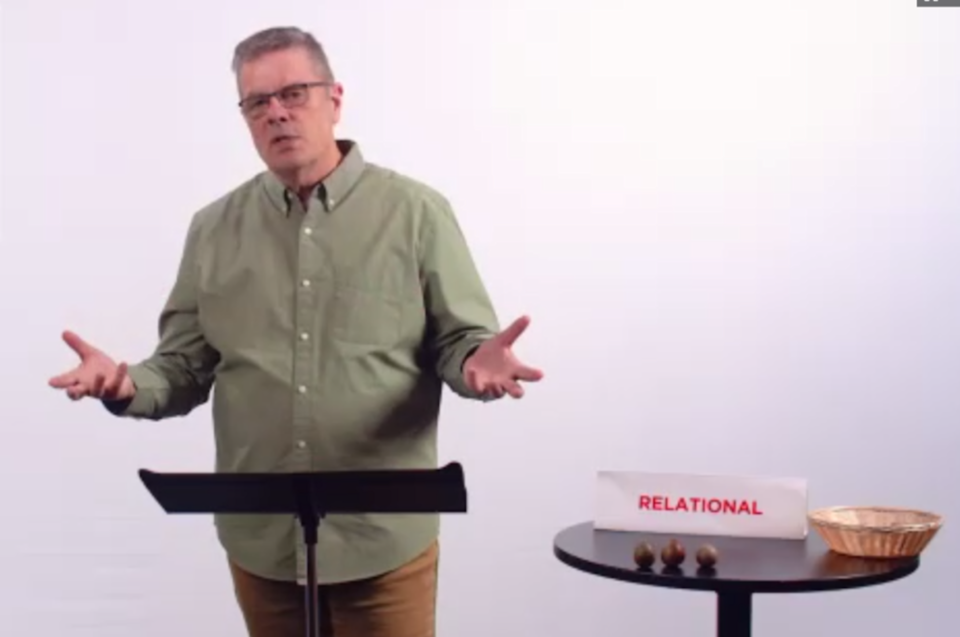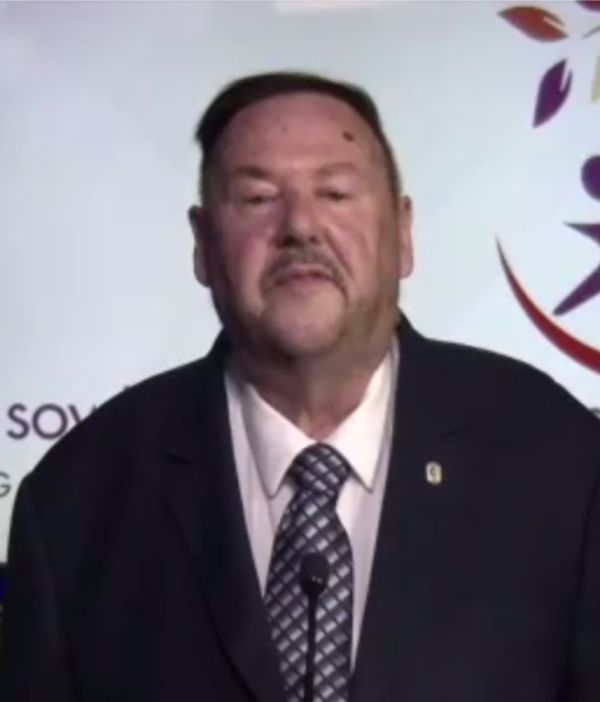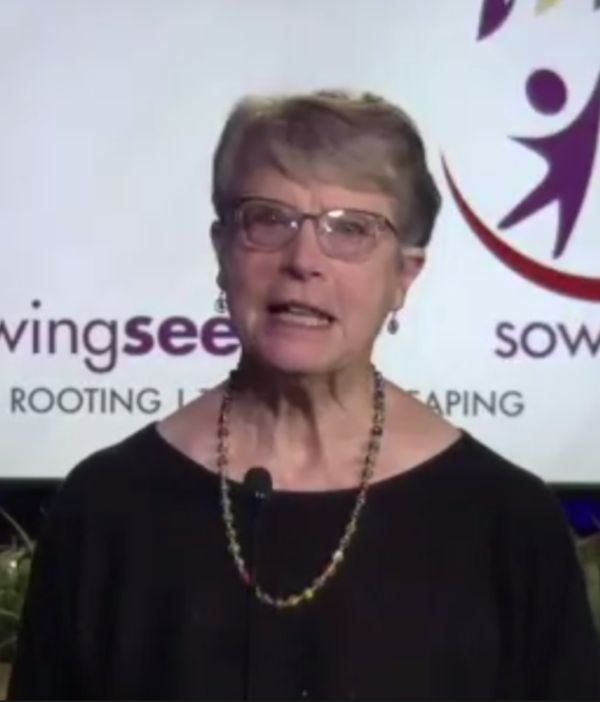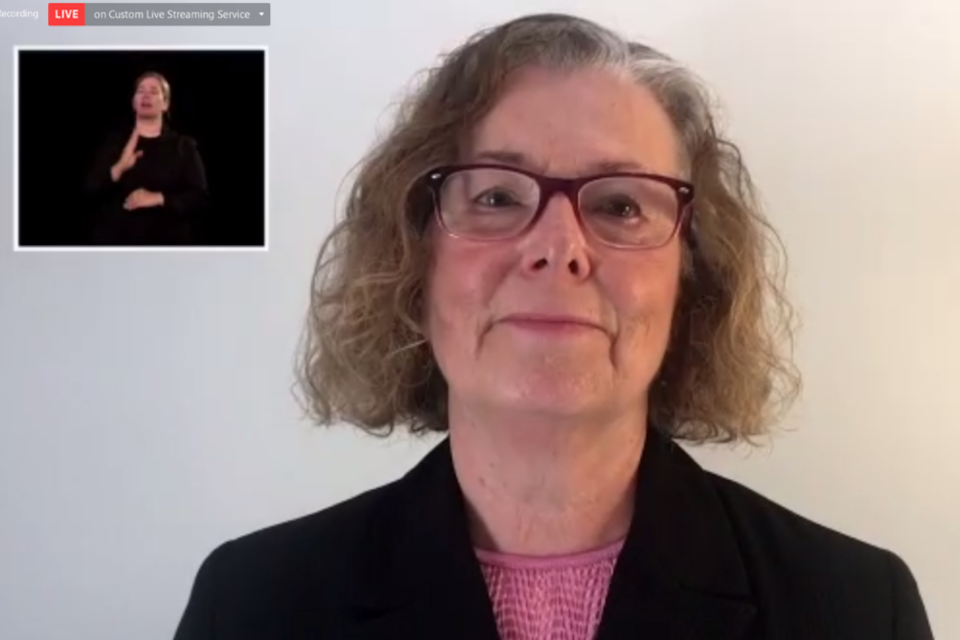Monday’s agenda for the 2020 Michigan Annual Conference included a series of voices sharing lessons and reports with invitations, challenges, and encouragement.
KAY DEMOSS
Senior Content Editor
July 27,2020 | LANSING – “Essential” has become an often-used word during the global pandemic. It means “absolutely necessary” or “extremely important.” A typical Michigan Annual Conference is about its business for approximately 27 hours, spent in worship, reports, legislation, and celebration. The 2020 Virtual Annual Conference agenda planned for 11 hours of engagement. Early adjournments brought that number to nine hours together online. The focus indeed remained on the “essential” work of the body.
The essentials on Monday, July 27, included reporting, spiritual centering, and teaching. Brad Kalajainen, lead pastor of Cornerstone Church, offered opening devotions. In the afternoon, conference members heard from Anne Soles and John Wharton, conference lay leaders; and the Rev. Elizabeth Hill, dean of the Michigan Conference Cabinet.
Six seeds for church vibrancy
Kalajainen began by asking viewers to “think about your church,” as the overarching vision of the 2020 Annual Conference is Vibrant Congregations. He shared a gardening experience – “Whoa, I’ve never seen broccoli like that in my whole life!” — that happened while serving Freeport UMC. His takeaway from that summer, fresh-out-of-seminary, is, “Anyone can plant blue ribbon broccoli with the right soil, water, and sun. In the same way, God can use ANYONE to build a VIBRANT church.”

The preacher described six seeds “that will bear fruit if planted, nurtured, and tended over time.” He invited viewers to “pursue them relentlessly.”
- Seed #1 – We must become more conversational. “Being conversational is about the use of words, but so much more. It’s the way we are used to doing things. It involves our assumptions that everyone’s in the know … Being conversational is starting with where they are, not where we are … How ‘accessible’ is your church to people who are not insiders?”
- Seed #2 – We must become more invitational. “Becoming an invitational church means even more than inviting people to worship. It means inviting people into our homes who are not believers. It also means having a church that invites people to give their hearts and lives to Jesus Christ.”
- Seed #3 – We must become more relational. “Being relational is so much more than saying, ‘Hi,’ to a new person, or swarming them after church and inviting them to lead middle school … [Here’s] God’s 20/20 vision for the church. Gather for worship together, then meet house to house in smaller groups. That’s relational. Church is less about business and more about caring for people’s souls.”
- Seed #4 – We must become more glocal. “That’s local and global. This is the mission of the church. Is your church deeply embedded in the community, to the point that if your church closed down, would the community really care? When Jesus left the earth, he sent the early church off to be glocal. He said to them, ‘But you will receive power when the Holy Spirit comes on you; and you will be my witnesses in Jerusalem, in all Judea and Samaria, and to the ends of the earth.”
- Seed #5 – We must become more digital. “Digital church is here to stay even if the physical church makes a return. Digital church means more than a worship service. It has to engage kids, students, small groups, classes, social media, and much more. Digital church says, ‘We never closed. We are simply meeting in hundreds of locations.”
- Seed #6 – We must become more foundational. “Being foundational means Jesus is the foundation of everything we do … to our worship, teaching, prayer, our care, and how we understand mission … If the motivation of your church is based on anything else, it will be like planting a garden on hard clay.”
Kalajainen closed with a remark made by the Rev. Michael Mille, whose church was devastated by Hurricane Katrina: “We used to sing Jesus is all we need. Now Jesus is all we’ve got.” Kalajainen concluded, “Pre-corona, post-corona or somewhere in between, Jesus is all we got. Which one or more of these seeds does your church need to focus on first?” (Click here for the text of Brad Kalajainen’s devotions.)
Laity and clergy partnership
The Michigan Conference has been blessed with two able lay leaders over the past four years. Anne Soles (West Michigan) and John Wharton (Detroit), standing together at the close of the 2018 Annual Conference, lit a candle to symbolize the uniting of the United Methodists across the state. The pair ended their time of service with a joint report on Monday afternoon. It was announced in the Nominations Report just prior, that Annette Erbes is the new conference lay leader.

Wharton began his remarks by saying, “Vital congregations show strong ministries because of the partnership of the laity and clergy. Citing Acts 6:1-14, he said, “Even the early disciples knew the importance of increasing the number of people performing ministry.” Wharton talked about vocational and spiritual gifts and shared Paul’s statements in 1 Corinthians 12:4-11 stressing, “the manifestation of the Spirit for the common good.”
He recommended the Lay Servant Ministry program and Your Spiritual Gifts Inventory by Charles Bryant, as helpful resources for those wishing to look at their spiritual gifts. “Let me finish,” Wharton said, “by saying that I hope each of you looks for areas where you can support the ministries of your congregation.”

“It’s been quite a year!” Anne Soles remarked regarding the Board of Laity. “Guess what?” was the catchphrase characterizing their work of adaptive leadership.
Soles celebrated the fact that “The church—when you get down to it—is 98% laity!” As Wharton turned to scripture, Soles cited tradition. “To be a disciple, John Wesley’s General Rule calls for private acts of mercy—cleaning buckets, how to use ZOOM, bringing a casserole, and making a phone call. Each disciple is called to private action. It might be sharing a conversation. It might be sharing a chainsaw.” She went on. “Wesley calls for public acts of justice. How is it with our community? And, guess what? We have some challenges!” She noted that community is tattered by “virus lockdown, social distance in the hardware store, old fault lines of inequality and racism exposed.”
Soles stressed that building a network takes time and tools. “This moves at ‘walk speed’ not warp speed.” She called Jesus, “a blue highways man,” noting that, “He was always stopping to talk with the likes of Zacchaeus … He didn’t send a mass mailing or tweet.” His “slow manner” should also be ours; “no shortcuts and lots of labor.” Soles declared, “For disciples, all church is local. The transformation of the world begins with the making of disciples. With the one-on-one connections.”
Recalling the candle-lighting moment of 2018, Soles concluded, “It is burning today, brighter perhaps as the world has grown darker. So, we say, go forth in confidence. And keep your tool kit with you.” (Click here for the text of the remarks from the lay leaders.)
Dean reports church alive and well
The Rev. Elizabeth Hill, outgoing superintendent of the Heritage District, has served as the dean of the Appointive Cabinet since the close of the 2019 Annual Conference. “What a year it has turned out to be!” She spoke of the first nine months that ensued. “We left the 2019 Michigan Annual Conference with mixed emotions regarding the actions of the conference and the uncertainty of the next General Conference around issues of inclusivity of the LGBTQI community.” She added, “I prayed fervently that God’s peace and love would permeate the conference so that we could focus on the work of being the Christian Church.”

She reported that in fall 2019, many churches were preparing for Local Church Assessment and Church Unique or living out what they learned through the Vital Church Initiative. Hill celebrated the engagement of Michigan congregations in many types of mission outreach. “Issues that divided churches theologically did not keep God’s work from happening, nor did it stop the love that God showed the world through his son Jesus the Christ,” she said. “The winter was full of promise and hope.”
The dean went on to describe how the coronavirus changed the ministry landscape of the past four months. “Through hard work and the grace of God, the church did not close!” Hill told how determined pastors and church members learned how to use new technological tools with the help of Annual Conference resources. “It was amazing to see how creative the churches became,” she observed. She acknowledged struggles and worries but reported gains, as well. “Sunday morning worship came in from the congregation and people outside of the congregation! … God’s message was amplified by online worship! Monies were a worry, and yet in many churches, the members were faithful in their tithing, allowing the work of the church to continue strongly. God provided!”
Hill turned attention to recent developments in the streets of America’s cities. “Through George Floyd’s death, we are reawakened to the racism that exists in our nation … The nation responded. Black Lives Matter protest took place around the nation, the state, and in our communities. Congregations and pastors joined together to raise our voices.” Noting that there is still much to be done to dismantle racism, she asserted, “The work of being an anti-racist white person needs to be active in the life of our churches.” (Click here for the text of Elizabeth Hill’s report.)
What common thread ran through the messages shared by Brad Kalajainen, John Wharton, Anne Soles, and Elizabeth Hill? Amid all the challenges of 2020, God is with The Michigan Conference! Jesus is all we got. And that is cause for great rejoicing.
Last Updated on September 20, 2022

